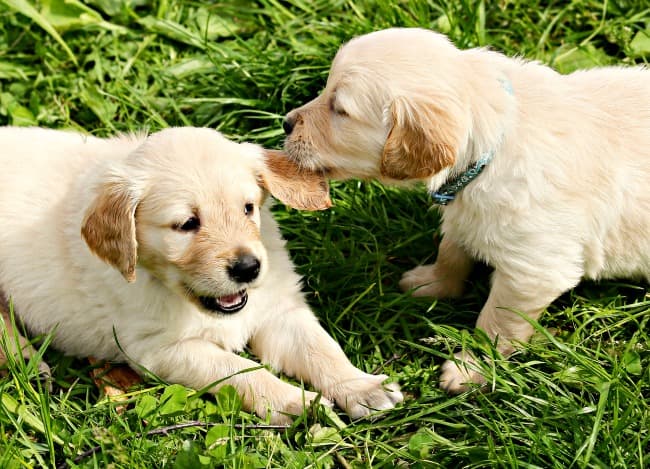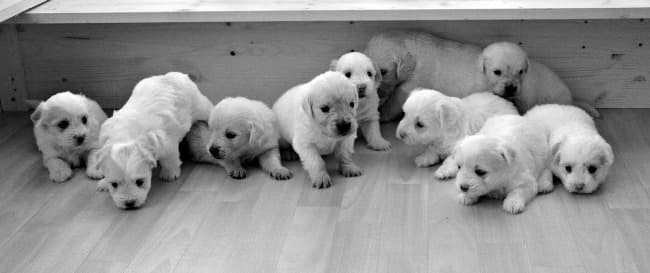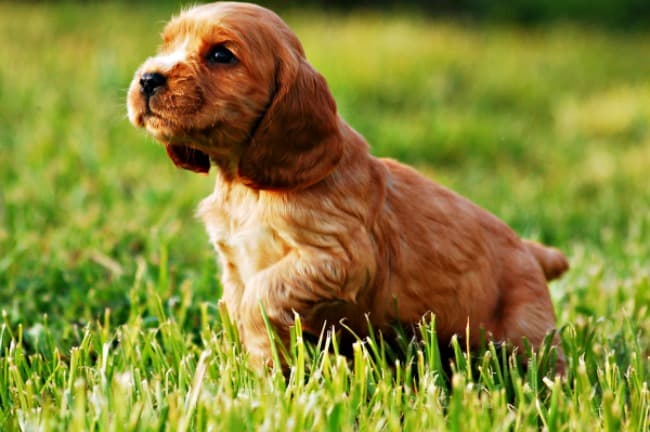How To Choose A Puppy
Learning how to choose a puppy who is the right fit for your family and lifestyle is hugely important.
Unfortunately all that built-in cuteness puppies have in abundance
isn't necessarily good news because their undeniable charms make every
pup seem like the perfect choice... and sadly that isn't always the
case.
You need to know how to choose a puppy that's a good match for your family, home, lifestyle and activity level if you want a happy-ever-after relationship with your little Rascal (or Rascal-ette).
Every dog breed has it's own inbuilt characteristics, traits and energy levels and it's a good idea to give some thought to these before you go out and get your pup.
Because when you're face to face with six pairs of puppy-dog eyes your logical thought processes are going to shut down and the 'awww' factor takes over!
And of course once you've shortlisted a breed or two, or decided to go with a mixed-breed pup, then you need to know how to pick a specific pup from a litter of adorable look-alike's.

You'll want to be able to recognize personality traits in individual pups, and be able to spot the warning signs of poor health or temperament.
It's a lot to think about, but it's all very important.
But don't worry, on this page you'll find tons of tips and advice to help you figure out which breed, and which puppy, is the one for you.
So, let's get started.... your Rascal awaits :)
How To Pick The Right Dog Breed
There are a LOT of different dog breeds to choose from.
The American Kennel Club alone recognizes almost 180, and there are numerous other organizations that register rare or unusual breeds, 'designer' or hybrid dogs and some bully breeds such as the Olde English Bulldog, Pitbull or Staffordshire Terriers and more.
And of course there is the 'humble' mixed breed puppy and the combination of size, coat type, color and characteristics there is almost endless.

Each pure breed has their share of health conditions which are passed on from generation to generation through their genes.
A good breeder will screen their dogs for these breed-specific inherited diseases and try to make sure that they don't show up in their pups, but it's not an exact science.
Make sure that you know what tests are standard for parent dogs of the breed/s you're interested in, and the potential symptoms and problems that you could see in your pup.
That way if a problem shows up you'll know what to do.
Mixed breed dogs tend to be healthier overall than their purebred cousins, mostly because they haven't been in-bred in the same way.
If you choose a pup whose momma and dad are both purebred (but of different breeds) there's still a chance that one, or both, of them could pass a genetic condition onto your little Rascal.
A mixed breed who is of the 'Heinz 57' variety is not likely to have the same problems.
When you're thinking about how to choose a puppy I absolutely recommend thinking about what type of DOG you want to own.
This is because your Rascal is going to be an adult dog for a lot longer than he'll be a puppy, you want that dog to be the one you're hoping for.
Also, definitely do some research on breeds that appeal to you.
A little time and effort at this point could save you a lot of time, heartache and money down the road.
Ask yourself questions and be honest with the answers.
- Will a quiet, friendly pup be a good fit for my empty-nester home.... or do you we need a outgoing, active little guy who will happily accompany us on your cross-country road trips to visit the grand-kids?
- Is a teacup-sized pup robust enough to stand up to my toddlers hugs?
- Can our tiny two-bedroom house really accommodate a full-grown Great Dane?
The most important things to think about include:
- Size of your home
- Size/availability of a safe, fenced yard
- Whether you have small children, elderly relatives or people with allergies in your home
- You, or your family's, activity level
- Finances (big dogs cost considerably more to raise than small ones do)
But although practicalities are important when you're figuring out how to choose a puppy... you have to consider your heart and listen to gut-level instincts too.
If you've wanted to own a German Shepherd, Dalmation, Chihuahua, or any other breed, for as long as you can remember - then don't ignore that longing.
Give some serious thought to how you could fit your ideal dog into your life and see if you're willing to make the changes/sacrifices necessary to make it happen.
As long as you've done your homework, know what your chosen breed needs and are sure you can provide it, your chances of you and Rascal being best friends for life are pretty good.
What's The Next Step?
Finding a great breeder!
Before he comes into your life, your pup will have been cared for by his doggie momma and the human's who took care of her.
Their input has a big effect on how he develops and his attitudes and behavior towards both people and other dogs.

So it makes sense to choose a pup who has had a stable, loving and stimulating environment during his first and second months of life, and whose momma is healthy and good tempered.
Look for a breeder who does the required health testing on their dogs, who can give you pedigree information, proof of health checks and vaccinations and is happy to let you come and visit with the pups and their parents.
Your little Rascal's will copy his momma's behaviors and attitudes (just like your toddler copies the way you do things) and if she's bad tempered or anxious, if she growls at strangers or cowers away, he'll think these are the 'right' way to act.
You want to see a momma dog who is friendly and self-confident, neither aggressive, defensive or fearful. That way you know that your puppy is already learning that people are friends and that the world is not a scary place.
And finally, choose a breeder that you find easy to talk to, who feels trustworthy and knowledgeable and that you like.
Once you've brought your little Rascal home, chances are that you'll have questions or want advice from this person, and it makes the whole situation easier when you feel comfortable with them.
How To Choose A Puppy That's The Right Fit
Okay so you've studied the pros and cons of the dog breeds you're interested in and taken a close look at your home and lifestyle.
You've found a breeder (or two) that you're happy with and now you're ready for the exciting part - picking your puppy from the litter.
But, oh my gosh, they're ALL adorable........... how on earth can you choose just one?
It's not easy that's for sure, but the key is not to rush.
Spend some time with the puppies as a group, then some one-on-one time with the ones that have caught your eye (or your heart).
Puppy Personalities
A puppy who's big and bold when he's got all his brothers and sisters around him may be much more timid (or overly demanding) once he's separated from the pack.

Conversely, a pup who seems timid and is overpowered by his bigger, louder siblings, may show quiet confidence once he's alone, or he might show true fear.
These are the sort of insights into his personality that will help you pick out the right puppy for YOU.
If this is your first puppy and he's to be a family pet (especially in a home with children), then you're best bet is to pick a happy, friendly, middle-of-the-road pup.
The loudest, pushiest, bossiest puppy might shoulder his way to the front and onto your lap, but his strong personality might make him a little more challenging to train than you'd like.
But the littlest one, who shrinks back when you hold out your hand or immediately rolls over onto his back whenever you touch him, might be a little too submissive or anxious.
Pups like this may take a long time to gain self confidence, need extra socialization, or get stressed-out very easily and occasionally (if their fear/anxiety is extreme) can nip or bite if they get really scared.
When you're looking at half a dozen or more wriggling, squirming, licking and yapping puppies it's difficult to know how to choose a puppy that's right for you.. and all too easy to choose on impulse.
But there is a way you can get a better idea of any puppy's personality.
It only takes a few minutes and can really help you choose a pup who has the personality traits that you're looking for.
It's called Temperament Testing.
Many reputable breeders use these temperament tests to make sure each and every pup goes to the right home.
And dog professionals use them when they want a puppy for a specific purpose - either as a sport competitor, rescue/tracking/service dog, protection dog or for herding, hunting, show and so on.
Recognizing A Healthy Puppy
If you're buying a purebred puppy and have done your breeder research properly, you shouldn't have to worry too much about your puppy's health (but you still need to know how to tell if a pup is not 100% healthy)

Your little Rascal should have had regular vet check-ups, have been given his first set of puppy vaccinations and been treated for worms.
A good breeder will have made sure that he's been kept in a clean environment and had plenty of socialization and TLC.
This is the ideal scenario, and what we all hope for.
But life is rarely 'ideal', and sadly too many puppies come from parents who aren't healthy or well cared for, and homes which are not clean or nurturing.
If your Rascal came to you from a box or truck-bed outside your local superstore, from a wire-pen at the side of the road etc., then you definitely need to do your best to make sure that he's basically healthy, even if he's not had the best start in life.
Puppies or dogs from rescue organizations or pounds have usually been spayed or neutered, vaccinated and treated for worms.
But depending on where they came from originally and the condition they were in, you could still have some skin problems, parasites, or other niggling health worries to deal with.
They're not likely to be major (because those would have been picked up by the organizations' vet staff) but might cost you some money, and take a little time to disappear.
The saying that 'There's no such thing as a free puppy' is 100% true because a every puppy is going to cost you more money than you expect even under 'ideal' conditions.
If your little Rascal starts out with poor health you could be looking at a lot of veterinary bills and a whole lot of heartache.
You Might Also Like:
- Home
- How To Pick A Puppy



